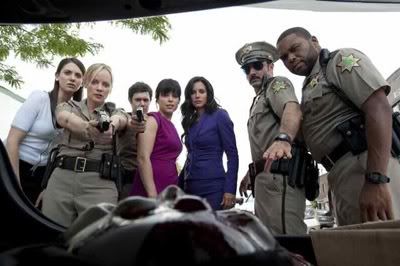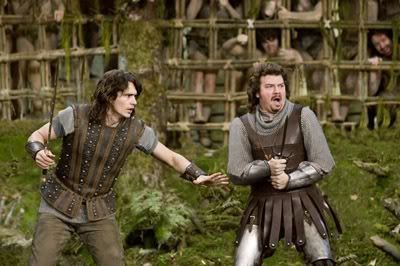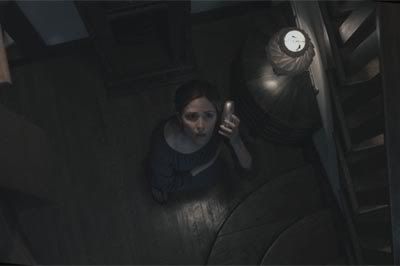
Hollywood horror films draw from a grab bag of assorted Halloween party favors, but amidst all the cheap plastic spider rings, director James Wan inserts a tarantula or two for good measure. His latest, "Insidious," takes a see-what-sticks approach that can sometimes be as frustrating as it is refreshing, but in a cinematic climate where scary movies are becoming an increasingly on-rails experience, every goose bump is worth its weight in gold (and I imagine it adds up).
"Insidious" has plenty of genuinely chilling moments, and makes better than average use of the oft maligned 'jump scare.' The technique doesn't always deliver the desired impact, but that such instances are uneven in effectiveness is in a way an incredible asset. Emotionally, we're on our toes. Wan puts convention in a blender and the audience is often left reeling from the topsy-turvy inertia. That familiar horror guardrail is gone and we're left groping in the dark.
Taking a page from Sam Raimi (not to mention title work more than a little reminiscent of his 2009 flick "Drag Me to Hell"), Wan keeps us off-balance with unpredictable emotionality. Not every bizzaro changeup he pitches lands squarely in the strike zone—a bumbling pair of paranormal investigators falls flat on the comedy front—but by constantly upsetting our expectations, "Insidious" picks a cerebral scab and burrows under our skin. A particularly inspired and disorienting soundtrack choice is the use of Tiny Tim's "Tiptoe Through the Tulips," proving perhaps definitively that nothing is more terrifying than a ukulele.
Little unconventional details help too, and with credit to "Saw" screenwriting veteran Leigh Whannell, "Insidious" makes some subtly interesting choices. For once, our parental protagonists, Josh and Renai Lambert (Patrick Wilson and Rose Byrne), are not the progenitors of an only child. Creepy kids are a genre staple, but by diffusing that cliché with siblings, Whannell opens himself to some less-traveled roads. Unfortunately, one of his most glaring oversights is underplaying that idea; in the inferior second half of the film, the other offspring essentially disappear.
Or take, for instance, the critic's ace-in-the-hole: "Why don't they just leave the house?" Like in "Paranormal Activity," Whannell explicitly explains that the demonic presence is attached to his characters rather than their homestead, but they hightail it out of there all the same. I can't immediately recall another example of haunted protagonists rationally raising stakes in the middle of the second act.
It may seem insignificant, but it makes a big difference in a genre as delicate as horror, where the element of surprise is everything. If "Insidious" were comprised entirely of offbeat innovations, it would be a perfect film. But just as often, Whannell lets convention get the better of him, or he piles on too many sub-genres—what starts off in "Poltergeist" country winds up closer to "A Nightmare on Elm Street," if you can imagine that. The disparate elements clash and complement each other in equal measure.
Spearheaded by Wan and Whannell, the "Saw" franchise pushed horror in a new direction. "Insidious" nudges it back. Inspired by classic seventies spook-outs, the filmmakers crafted what feels like Hollywood's most synonymous effort in years, imperfect though it may be. There are no hidden camera gimmicks, and absent is the also oft maligned 'torture porn' the pair popularized eight years prior. Instead, expect to be treated to the unexpected. True, the beats and "Boos!" are familiar as can be, but when "Insidious" jumps the rails, it's one hell of a ride.
3/5


























